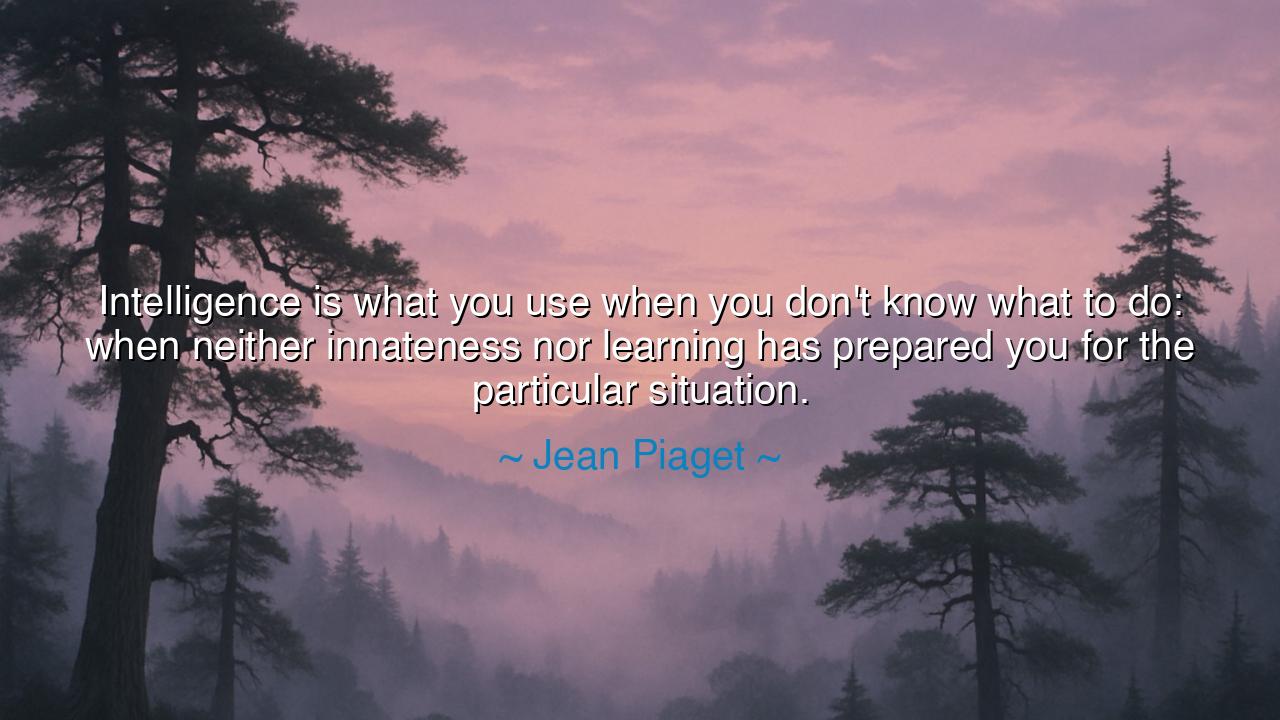
Intelligence is what you use when you don't know what to do: when
Intelligence is what you use when you don't know what to do: when neither innateness nor learning has prepared you for the particular situation.






"Intelligence is what you use when you don't know what to do: when neither innateness nor learning has prepared you for the particular situation." — Jean Piaget
Thus spoke Jean Piaget, the great Swiss philosopher and child psychologist, who spent his life uncovering the secret architecture of the human mind. In these profound words, he reveals the essence of true intelligence — not as the memorization of facts, nor the mere reflex of instinct, but as the power of the soul to act when all knowledge fails. To Piaget, intelligence is not a storehouse of what one already knows; it is the creative force that awakens when one stands before the unknown. It is the spark that bridges the gap between the familiar and the unfamiliar — the living proof that the mind was made not just to remember, but to invent.
Piaget observed that even the smallest child, when faced with something new, engages in an act of discovery that mirrors the work of the scientist and philosopher. A baby, confronted with a strange object, does not know its name or purpose — yet through curiosity, through touch, through experiment, the child learns. Here, Piaget saw a profound truth: intelligence begins not in certainty, but in uncertainty. It is born in the void, when instinct fails and habit has no answer. The wise, therefore, are not those who know all things, but those who, when faced with the unknown, have the courage to think anew.
To say that intelligence is what you use when “you don’t know what to do” is to recognize it as the essence of human adaptability. The animal survives by instinct; the machine by programming. But man — man alone — possesses the divine gift of improvisation, the capacity to shape new paths where none exist. It is this gift that raised our ancestors from the caves, that taught them to kindle fire and build civilization. For every great discovery — from the first wheel to the first spacecraft — was born in a moment when knowledge ended and imagination began. The unknown has always been the true measure of the human spirit.
Consider the story of Apollo 13, that doomed voyage to the moon. When an explosion crippled the spacecraft, the astronauts and engineers on Earth faced a crisis no manual could solve. Their learning had not prepared them for such chaos; their tools were limited, their time fleeting. Yet through intelligence — through the union of creativity, reasoning, and calm courage — they crafted a lifeline from scraps of metal, tape, and will. They thought beyond procedure, and through this act of pure invention, they turned death into survival. That, Piaget would say, is intelligence in its highest form — the capacity to act wisely and creatively when no rulebook remains.
Piaget’s insight also holds a lesson for the soul. Intelligence is not only for science or crisis; it is for life itself. There will come moments in every life when one stands before the unknown — the loss of a loved one, a dream that falters, a future unclear. In those hours, neither instinct nor past experience can guide us fully. What remains is our ability to reflect, to imagine, to adapt — to find new meaning and new paths in the wilderness of change. The intelligent soul does not surrender to confusion; it transforms confusion into discovery.
But to reach such wisdom, one must cultivate the habit of thinking freely. Piaget’s message to future generations is clear: do not mistake information for intelligence. Learning fills the mind, but it is thinking that awakens it. Question, experiment, observe — not just in books, but in the world, and in yourself. Train your mind not merely to recall, but to respond. When you face something unprepared, do not fear; that is the moment when your true mind begins its sacred work. For it is only in the unknown that intelligence reveals its full glory.
So let this be your inheritance, seeker of knowledge: use your intelligence bravely when the path ahead is unclear. Do not cling too tightly to what you know, for wisdom lives in the spaces between certainty. When the familiar fails you, let curiosity be your compass and creativity your fire. Embrace the unknown not as an enemy, but as the forge in which your intellect grows strong. For, as Piaget teaches, the truest intelligence is not what you have learned — it is what awakens within you when you stand before mystery and dare to think.






AAdministratorAdministrator
Welcome, honored guests. Please leave a comment, we will respond soon